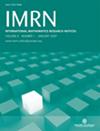On the Local Fourier Uniformity Problem for Small Sets
IF 0.9
2区 数学
Q2 MATHEMATICS
引用次数: 0
Abstract
We consider vanishing properties of exponential sums of the Liouville function $\boldsymbol{\lambda }$ of the form $$ \begin{align*} & \lim_{H\to\infty}\limsup_{X\to\infty}\frac{1}{\log X}\sum_{m\leq X}\frac{1}{m}\sup_{\alpha\in C}\bigg|\frac{1}{H}\sum_{h\leq H}\boldsymbol{\lambda}(m+h)e^{2\pi ih\alpha}\bigg|=0, \end{align*} $$ where $C\subset{{\mathbb{T}}}$. The case $C={{\mathbb{T}}}$ corresponds to the local $1$-Fourier uniformity conjecture of Tao, a central open problem in the study of multiplicative functions with far-reaching number-theoretic applications. We show that the above holds for any closed set $C\subset{{\mathbb{T}}}$ of zero Lebesgue measure. Moreover, we prove that extending this to any set $C$ with non-empty interior is equivalent to the $C={{\mathbb{T}}}$ case, which shows that our results are essentially optimal without resolving the full conjecture. We also consider higher-order variants. We prove that if the linear phase $e^{2\pi ih\alpha }$ is replaced by a polynomial phase $e^{2\pi ih^{t}\alpha }$ for $t\geq 2$ then the statement remains true for any set $C$ of upper box-counting dimension $< 1/t$. The statement also remains true if the supremum over linear phases is replaced with a supremum over all nilsequences coming form a compact countable ergodic subsets of any $t$-step nilpotent Lie group. Furthermore, we discuss the unweighted version of the local $1$-Fourier uniformity problem, showing its validity for a class of “rigid” sets (of full Hausdorff dimension) and proving a density result for all closed subsets of zero Lebesgue measure.论小集合的局部傅里叶均匀性问题
我们考虑形式为 $$ \begin{align*} &;\lim_{H\to\infty}\limsup_{X\to\infty}\frac{1}{\log X}\sum_{m\leq X}\frac{1}{m}\sup_{\alpha\in C}\bigg|\frac{1}{H}\sum_{h\leq H}\boldsymbol{\lambda}(m+h)e^{2\pi ih\alpha}\bigg|=0, \end{align*}$$ 其中 $C(subset{{\mathbb{T}}}$)。$C={\{mathbb{T}}}$的情况对应于陶的局部$1$傅里叶均匀性猜想,这是乘法函数研究中的一个核心未决问题,在数论中有着深远的应用。我们证明上述猜想对于任何零 Lebesgue 度量的闭集 $C\subset{\{mathbb{T}}$ 都成立。此外,我们证明,将其扩展到任何具有非空内部的集合 $C$ 等于 $C={\{mathbb{T}}$ 的情况,这表明我们的结果本质上是最优的,而无需解决完整的猜想。我们还考虑了高阶变体。我们证明,如果线性相$e^{2\pi ih\alpha }$被多项式相$e^{2\pi ih^{t}\alpha }$替换为$t\geq 2$,那么对于任何上盒数维度为$< 1/t$的集合$C$,该声明仍然成立。如果将线性相位的上位替换为来自任意 $t$ 阶零potent Lie 群的紧凑可数遍历子集的所有零序列的上位,那么该声明也仍然成立。此外,我们还讨论了局部 1 美元-傅里叶均匀性问题的非加权版本,证明了它对一类 "刚性 "集合(全豪斯多夫维度)的有效性,并证明了所有勒贝格度量为零的封闭子集的密度结果。
本文章由计算机程序翻译,如有差异,请以英文原文为准。
求助全文
约1分钟内获得全文
求助全文
来源期刊
CiteScore
2.00
自引率
10.00%
发文量
316
审稿时长
1 months
期刊介绍:
International Mathematics Research Notices provides very fast publication of research articles of high current interest in all areas of mathematics. All articles are fully refereed and are judged by their contribution to advancing the state of the science of mathematics.

 求助内容:
求助内容: 应助结果提醒方式:
应助结果提醒方式:


